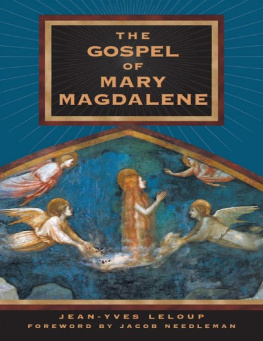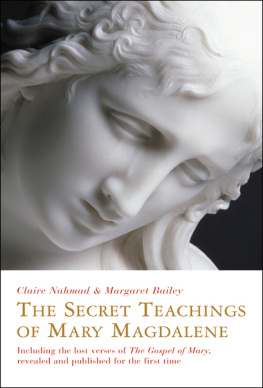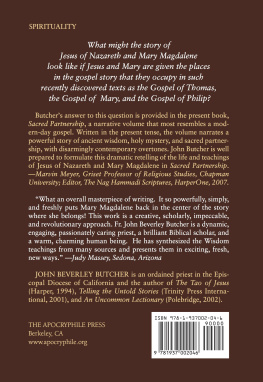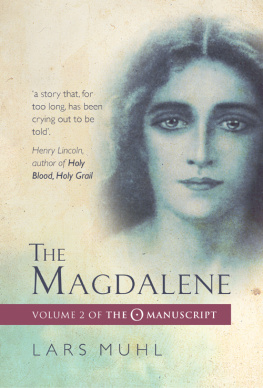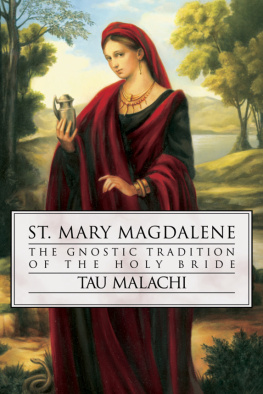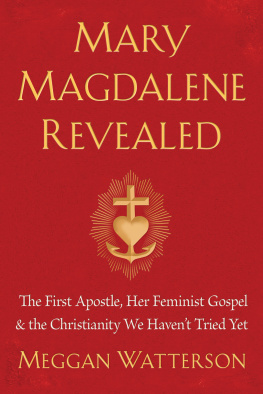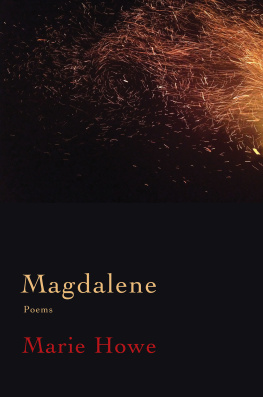Diana Barsham is a cultural historian and biographer with a special interest in lives that combine the secular and the spiritual. She has published several books in this field including a ground-breaking study of Sir Arthur Conan Doyle and another on the Victorian womens movement and alternative spiritualities. Her interest in Mary Magdalene derives from her work at the University of New York in London where she taught courses on ancient culture and early Christianity. She currently lives in Provence where The Touch of the Magdalene is set and in Somerset where there are many churches dedicated to the saint.
This book is dedicated to my husband, Peter Hoye.
The right of Diana Barsham to be identified as author of this work has been asserted by the author in accordance with section 77 and 78 of the Copyright, Designs and Patents Act 1988.
All rights reserved. No part of this publication may be reproduced, stored in a retrieval system, or transmitted in any form or by any means, electronic, mechanical, photocopying, recording, or otherwise, without the prior permission of the publishers.
Any person who commits any unauthorised act in relation to this publication may be liable to criminal prosecution and civil claims for damages.
A CIP catalogue record for this title is available from the British Library.
1.14 Magda Relives (And Stops Reliving)
And so, I climbed up here that night, after a long and painful journey: I was learning, so I told myself as I toiled upwards, how to ascend. I came to Mthamis and from here, from its clear, unbroken heights, I could see in one wide glance, the whole catastrophe of my life: it was all there in front of me, the wrecked and wretched enterprise from which I was lucky to have stepped free.
But then, after the early period, after a few weeks and months, I really did begin to experience some sort of ascent, in parts of my mind, at least, some lifting out of that long dark view behind me. Perhaps it was just that I was recovering from the journey, but it felt as if I was shaking off some miasma, some mountain mist that clung to my clothing, as if I were climbing higher than the wreckage itself, seeing it at least from some vantage point that gave me, if not perspective, then clarity of vision. I wondered if dying itself, once one had shaken off all the old suffering, was like this too: not as bad as one had imagined it to be. I felt I had undergone a rite of passage through death itself, and the goddess who dealt in such things, had lent me her assistance. Dying has more than one face; women do it differently.
My ascension had relieved something. The higher I was, the safer I felt. Over the first two years, even my tears began to change. Until then, I had waited for him to come. I had believed in the plan. I thought I would meet with Yeshua again. I thought he would come to me. I hoped, even sinfully longed, for him to come to me, so we could be together, once more at least, so that the pain of this love, the always unfulfilled longing, might finally find some completion. Find at least something that would help me understand who he was, who I was for him, who we were for each other and who, since our last encounter, he had now become.
I was so sure this had to happen, that the meeting would come. And yet, it did not. I waited and waited. Mthamis became the place in which I found myself lost, left behind, a figment of some all but forgotten dream. It was as if I had lost him all over again.
But this is how it is here: the land is kind to certain sorts of memory. It understands, accepts, and even cherishes, the better type of heartbreak. I think of Pons, the young woman who gave him her recipes. It is a land that heals too. It is the quality of the light that does it: not the light of the world but the light of some higher place; a light that has bathed itself in joy. Jocunditas, the Romans call it.
My tears, the ones I shed night and morning, didnt stop but they started to change as if the stones they flowed over were no longer so rough and piercing as they had been but softer, smoother, flattened by the water. The wound that affected all of us, the pain, the rejection, the incomprehension, the sheer atrocious loss, all of this, started slowly to change its complexion. The cold blank that had seeped like death through my memory began to lighten, the memories themselves began to revive, take on life again. Suddenly, out of nowhere and quite unbidden, as if I were still living them, they would come floating back to me, vivid and bright as soft-winged butterflies or those iridescent dragon flies that live along the river.
Id be doing some mundane task and I would suddenly step out of my life now, my quiet, hidden life and I would find myself in one of my other lives, just for a moment Id be there, exactly as I used to be, at Herods court, in Tiberias, with Felix first, then with Joanna. On the road, the shape of the dust in the distance, the familiar shores around Galilee, the path across the wheat fields, the curious silence of the olive groves; the different listening of the crowds, the faces of those who were healed.
They didnt stay, these memories, I didnt reconstruct them or try to hold them to me. I watched them instead: little living inconsequential things, but colourful and unembittered, no longer attached to the suffering of the time, no longer in thrall to those who had turned against me but free to be nothing now except themselves.
At least in the daytime, my anger began to subside too. I could remember things in this new light without the pressure of any emotional distortion. I could remember how Yeshua had been pleased with me, how he saw me as a conquest worth making, his first fruits, he said; how he was proud when I heard his call. I was his well and his watchtower; a kind of measure he used to judge others. I could even remember how he let loose a bird and then caught it again and held it out for me. It could have flown away but somehow, as if he had tamed its wild free life in a second, it didnt fly. It sat there on his finger. Magic, I thought. To be able to do things like that. Without thinking. I remember shaking my head and how he nodded lightly and tossed it upwards again.
In time, I could even bear to re-inhabit, like suddenly slipping into a piece of fine clothing, the good memories, those that carried a promise of happiness inside them. He taught me to cry. That, I have come to realise, was his great gift. Gradually over the years the tears still fell but painlessly, like soft rain, like clear water over stone; emerald, blue, brown; all the eyes in the world could be washed by those tears! Tears of love; tears of joy; tears at the core of who I was. Water. Sunlight on clean water! A source bursting from the rock: a spring, a fountain, transforming, and with the power to transform, everything it touched. I cannot sit in any temple for long now before I find myself weeping inexplicably. People used to come sometimes simply to watch me cry.


